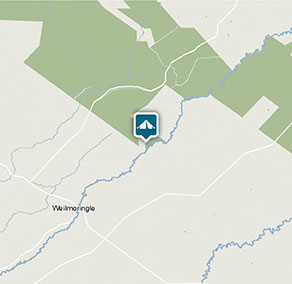Culgoa River campground
Culgoa National Park
Visitor info
All the practical information you need to know about Culgoa River campground.
Getting there and parking
Culgoa River campground is in the Burban Grange precinct of Culgoa National Park. To get there:
- Take the unsealed road north-east of Bourke for 180km, or the unsealed, dry weather road north of Brewarrina for 120km.
- The campground is 14km from the southern entrance of the park
The small townships of Weilmoringle, on the south-west side of Culgoa, and Goodooga, on the east side of Culgoa, offer no fuel, so please ensure you have enough before departure. The larger towns of Bourke and Brewarrina are good places to stock up.
Road quality
Check the weather before you set out as the road to this campground can become boggy when it rains.
- Unsealed roads
Vehicle access
- 2WD vehicles
Weather restrictions
- Dry weather only
Parking
Parking is available at Culgoa River campground.
Best times to visit
There are lots of great things waiting for you in Culgoa National Park. Here are some of the highlights.
Spring
After reasonable winter rains, the park erupts with blooms of native wildflowers, and animals begin to raise their young.
Summer
Summer in Culgoa can be incredibly hot, so hiking should be attempted by experienced walkers only. For everybody else, this is a perfect opportunity to take advantage of the coolness of Culgoa River.
Winter
This is a great time to settle in at Culgoa River campground, with winter the best time for walking in the park. Wildlife is still abundant and birdwatching is superb.
Weather, temperature and rainfall
Summer temperature
Average
21°C and 34.9°C
Highest recorded
46.4°C
Winter temperature
Average
5.7°C and 19.6°C
Lowest recorded
-3.3°C
Rainfall
Wettest month
January
Driest month
August
The area’s highest recorded rainfall in one day
207.1mm
Facilities
- Water is not available at this campground.
- Rubbish bins are not available, so please take your rubbish with you when leaving.
Toilets
- Non-flush toilets
Picnic tables
Carpark
Maps and downloads
Prohibited
Noise restrictions apply at this campground
Gathering firewood
Firewood is not provided and may not be collected from the park.
Generators
Generators are not permitted in this campground
Pets
Pets and domestic animals (other than certified assistance animals) are not permitted. Find out which regional parks allow dog walking and see the pets in parks policy for more information.
Smoking
NSW national parks are no smoking areas.

Park info
- in Culgoa National Park in the Outback NSW region
Culgoa National Park is always open, but may have to close at times due to poor weather or fire danger.
